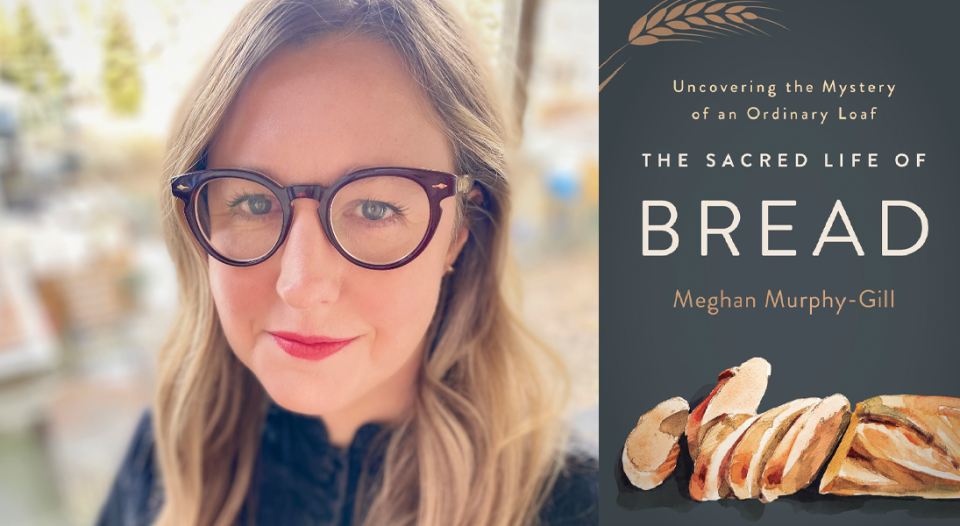Spend time reading the Bible and you’ll find an abundance of references to bread. It’s little surprise, then, that the topic captured the attention of Meghan Murphy-Gill, an Episcopal priest and former journalist. Her new book, The Sacred Life of Bread: Uncovering the Mystery of an Ordinary Loaf (Broadleaf Books, 2023), follows that loaf from a tiny seed to the moment you bite into a warm slice.
Living Lutheran caught up with Murphy-Gill to talk about bread, her book and the ways food and faith connect.
Living Lutheran: Could you tell readers about The Sacred Life of Bread?
Murphy-Gill: I first got the idea for a book that would explore bread from seed to table when I visited Plainsong Farm in Michigan to plant wheat for communion bread. I had been baking bread for years and was long interested in food justice and sustainable agriculture, but this was the first time I’d ever fully participated in something that integrated my food and faith in such a comprehensive way.
For years I would outline chapter ideas or jot down the beginnings of a chapter. Mostly I used this material to teach classes on eucharist, inviting others to reflect on the deeper meanings of what it means to break bread. From the time a single grain is planted in the soil to the moment a baked loaf is broken and consumed, bread satisfies physical and spiritual longings. I believe that the whole life of bread can reveal the world’s deepest mysteries as well as offer a pathway toward meaningful relationships with ourselves, others and our environment.
My goal for the book was to offer stories and insights from my own life and others’ that would lead fellow bakers and bread lovers to explore their own bread baking—and eating—as a spiritual practice and opportunity for personal transformation and healing. I wanted to illuminate the communal dimensions of this seemingly simple and ubiquitous staple.
How did you decide how to structure the book? It blends personal reflections, theology, journalism and recipes.
What I ended up writing included some of [the] process of how bread becomes bread, beginning with the place where we all begin—the soil. But I also included more personal stories than I’d originally set out to write.
“I believe that the whole life of bread can reveal the world’s deepest mysteries.”
Before I became an Episcopal priest, I was a journalist, because I love to learn and tell others’ stories. But I found it challenging to reflect deeply on bread and not uncover my own personal and spiritual discoveries I’ve made in my practice of baking as a form of prayer. I think that’s inevitable for anyone who approaches bread baking as a spiritual endeavor, and I hope that by telling some of my story, I am inviting others to consider how theirs relates to a food that brings us together in a truly holy communion.
Are there elements of the book you think would particularly connect with a Lutheran audience?
Bread in all its stages is a wonderful metaphor for many things in life, a “workhorse metaphor,” Peter Reinhart, who wrote the foreword, says. But for Christians especially, it is not merely metaphorical. Bread is sacramental. The making and breaking of it allows us to participate in a very real and concrete way in the greater mysteries of life. I don’t think it was by accident that Jesus held up a piece of bread for his disciples and said, “This is my body.”
You also tell the stories of people you connected with in pursuit of the book. Could you tell readers about one?
One person’s story I tell—though not her entire story—is Nurya Love Parish, who founded Plainsong Farm. I have followed Nurya’s ministry there for a while now, and it’s amazing to see how Plainsong keeps growing and responding to a call to feed people justly, meeting not just physical needs but spiritual ones too. Nurya’s work at the farm integrates food justice, racial justice and land justice in a way that is really unmatched.
How are you hoping readers engage with the book?
While I’m a priest and use the language of my Christian tradition to talk about meaning and spirituality, I hope that what I offer here is a way for anyone to explore the “more to life” so many of us are seeking, no matter what our religious or spiritual affiliation. I hope that readers find in the stories I tell and the reflections I offer a way to discover deeper meaning in their own bread baking if they already have a practice, or to give it a chance if they don’t.
I also would love it if church bread guilds could use this to reflect and pray together on the importance of their work as bakers of communion bread.





